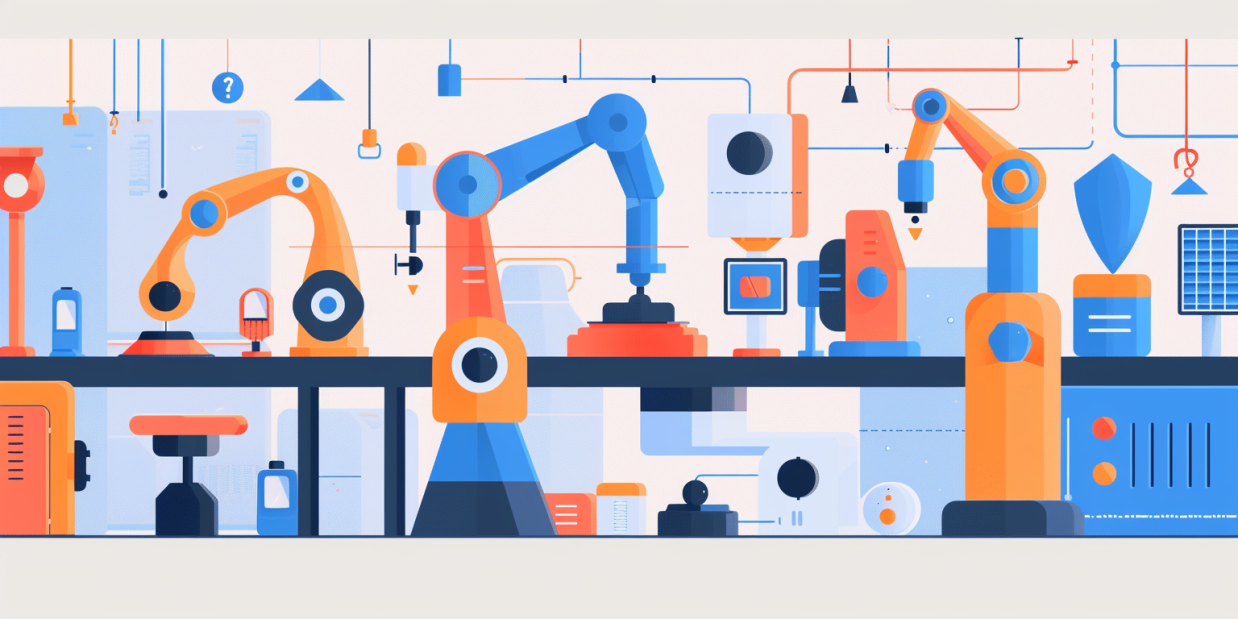AI in Manufacturing: The New Industrial Revolution
AI and automation revolutionize manufacturing, optimizing operations, transforming jobs. Embrace Industry 4.0 challenges, enhance efficiency, unlock customization, collaborate for a prosperous future in the Fourth Industrial Revolution.
Get referred to your dream company
Sections
The advent of Artificial Intelligence (AI) in manufacturing heralds a new era, often referred to as the Fourth Industrial Revolution or Industry 4.0. This transformative wave, characterized by the integration of AI, automation, and advanced data analytics, is redefining the manufacturing landscape, from operational efficiencies to the very nature of manufacturing jobs. This blog post explores how AI and automation are revolutionizing the sector and what this means for the workforce within.
Transforming Operations and Efficiency
AI-driven technologies are at the forefront of increasing operational efficiency in manufacturing. Through predictive maintenance, AI algorithms analyze data from machinery to predict failures before they occur, minimizing downtime and extending equipment life. Similarly, AI-enhanced quality control systems surpass human capabilities in identifying defects, ensuring products meet high-quality standards with unprecedented precision.
Supply Chain Optimization
AI's impact extends beyond the factory floor to supply chain management, where its analytical prowess enables the prediction of supply needs, optimization of inventory levels, and identification of potential disruptions. This results in leaner, more resilient supply chains that can adapt to changes quickly and efficiently.
Customization and Design
AI also unlocks new potentials in product customization and design. Through generative design software, manufacturers can input design goals and parameters, and AI algorithms generate multiple design options, optimizing for materials, manufacturing methods, and cost. This capability not only accelerates the design process but also allows for a level of customization previously unattainable, meeting the growing consumer demand for personalized products.
The Evolution of Manufacturing Jobs
The integration of AI and automation in manufacturing is reshaping the job landscape, requiring a workforce that can navigate the interface between technology and traditional manufacturing processes.
New Roles and Skill Sets
As routine tasks become automated, new roles emerge, focusing on the development, maintenance, and oversight of AI systems. Positions such as robotics technicians, AI system trainers, and data analysts are becoming increasingly crucial. These roles require a new set of skills, blending technical know-how with traditional manufacturing knowledge.
Upskilling the Workforce
To harness the full potential of AI in manufacturing, companies are investing in upskilling their workforce. Training programs designed to equip workers with skills in AI, robotics, and data analytics are becoming more common, ensuring employees can transition to the new roles AI technology creates.
Enhancing Human Capabilities
Rather than replacing human workers, AI in manufacturing often serves to enhance their capabilities. AI systems can take on monotonous, hazardous, or highly intricate tasks, freeing human workers to focus on areas where they excel, such as strategic planning, creative problem-solving, and overseeing AI operations. This symbiosis between human intelligence and machine efficiency is a hallmark of the new industrial revolution.
Navigating the Challenges
The transition to an AI-driven manufacturing sector is not without its challenges. Concerns about job displacement, the digital divide, and the need for significant investment in new technologies and training programs are at the forefront of discussions around AI in manufacturing.
Addressing Job Displacement
While AI creates new job opportunities, it also displaces certain roles, particularly those involving repetitive or simple tasks. Addressing this issue requires a proactive approach, with initiatives aimed at retraining and transitioning workers to emerging roles within the industry.
Bridging the Digital Divide
Ensuring equitable access to the benefits of AI in manufacturing is crucial. This involves not only investments in technology but also in the infrastructure and education needed to support a digitally skilled workforce, especially in regions with limited access to such resources.
Fostering Collaboration and Innovation
The successful integration of AI in manufacturing relies on collaboration between technology providers, manufacturers, educators, and policymakers. By fostering an ecosystem that encourages innovation and supports the workforce transition, the industry can navigate the challenges and harness the opportunities AI presents.
Conclusion
AI in manufacturing marks a new industrial revolution, transforming operations, supply chains, and the nature of work itself. As the sector evolves, the focus on upskilling, innovation, and human-machine collaboration will be key to realizing the full potential of AI. By embracing these changes, the manufacturing industry can achieve unprecedented levels of efficiency, customization, and productivity, securing its place in the future of global commerce. The journey ahead is complex, but with strategic investment in people and technology, the manufacturing sector can navigate the transition, ensuring a prosperous and inclusive future in the era of Industry 4.0.
Your career is worth investing in.
Try premium.
Community
© 2025 Crucible Fund LLC. All rights reserved.
